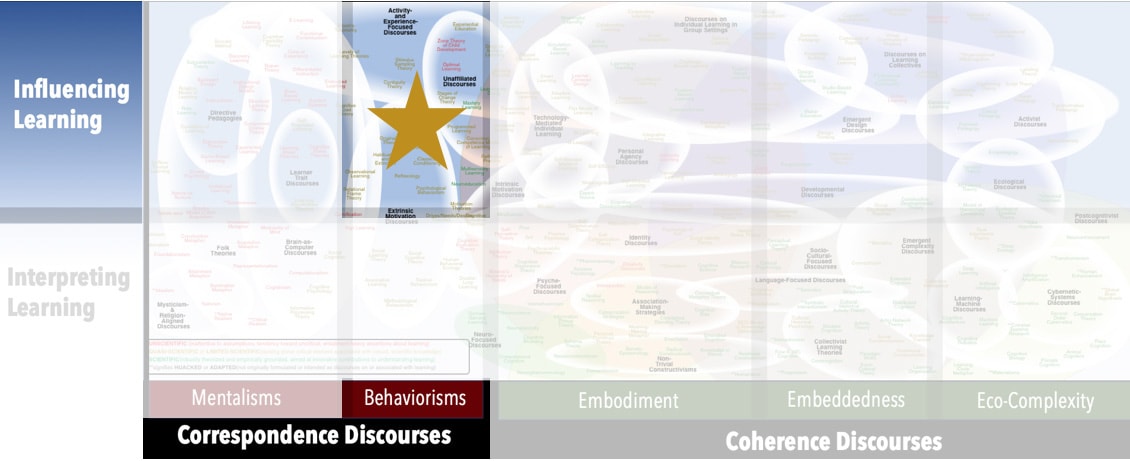Focus
Associations between identifiable environmental stimuli and observable measurable behaviorsPrincipal Metaphors
- Knowledge is … scope of possible actions and interpretations
- Knowing is … one’s sensory-motor, language-cognitive, and emotional-motivational repertoires
- Learner is … a reward-driven agent
- Learning is … additions to one’s repertoires
- Teaching is … conditioning (increasing or decreasing the probability of specific behaviors)
Originated
1990sSynopsis
Psychological Behaviorism embraces the insights of most Behaviorisms, but it is critical of the narrow focus on the learner’s sensory-motor repertoire. Seeking to understand more complex learnings – specifically, the learner’s language-cognitive and emotional-motivational repertoires – Psychological Behaviorism blends Classical Conditioning and Operant Conditioning. It links them with the observation that, in each case, the same stimulus can both elicit an emotional response and strengthen a motor behavior. This observation is offered as a means to explain how complex, new behaviors can emerge – which, in turn, links Psychological Behaviorism to Developmental Discourses. Associated discourses include:- Behavioral Repertoires (Arthur Staats, 1990s) – three complex clusters that are asserted to contribute to one’s personality: sensory-motor repertoire, language-cognitive repertoire, emotional-motivational repertoire
- Unified Positivism (Arthur Staats, 1970s) – an attempt within Psychology to unite the domain by embracing a strict empiricist approach, modeled on physics
Commentary
On the surface, it would seem that Psychological Behaviorism addresses educationists’ most frequent criticism of Behaviorisms, namely the inability to account for personality, creativity, and other complex human phenomena. A close examination of the theory’s vocabulary, however, reveals that it embraces without criticism the cause–effect, object-based, measurement-focused notions of most Behaviorisms. This limiting vocabulary is especially evident in the theory’s frequent assertion that learning is “cumulative” – a descriptor it positions as a new insight, but that is as ancient as (and relies on the same metaphors as) Acquisition Metaphor and many other Correspondence Discourses. (An alternative, which is invoked by most Coherence Discourses is to regard learning as “recursively elaborative.”)Authors and/or Prominent Influences
Arthur W. StaatsStatus as a Theory of Learning
Psychological Behaviorism can be classified as a theory of learning, because it offers insights into the complex dynamics of learning that are not offered by its near relatives.Status as a Theory of Teaching
Arguably, Psychological Behaviorism is better categorized as a theory of teaching than a theory of learning, given that its two foundational frames, Classical Conditioning and Operant Conditioning, are principally concerned with applying principles of Behaviorisms to manage learning.Status as a Scientific Theory
Psychological Behaviorism is explicit about its foci, its unit of analysis, and its construct of “learner.” Further, proponents of the theory have amassed a significant base of empirical evidence. However, supporters have not been especially attentive to its grounding metaphors, and they thus have a tendency to invoke notions associated with Folk Theories. That tendency means that Psychological Behaviorism does not meet all our criteria of a scientific theory of learning.Subdiscourses:
-
Behavioral Repertoires -
Behavioral Repertoires (Arthur Staats, 1990s) – three complex clusters that are asserted to contribute to one’s personality: sensory-motor repertoire, language-cognitive repertoire, emotional-motivational repertoire
-
Unified Positivism -
Unified Positivism (Arthur Staats, 1970s) – an attempt within Psychology to unite the domain by embracing a strict empiricist approach, modeled on physics
Map Location

Please cite this article as:
Davis, B., & Francis, K. (2023). “Psychological Behaviorism” in Discourses on Learning in Education. https://learningdiscourses.com.
⇦ Back to Map
⇦ Back to List
